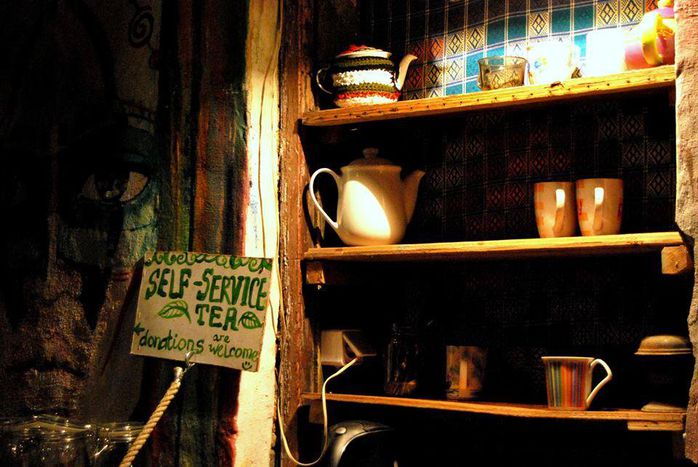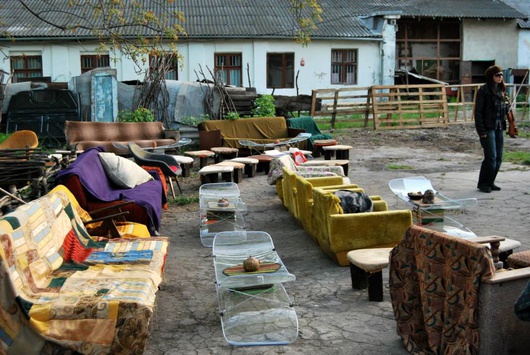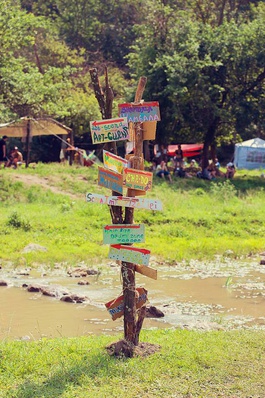
Gathering in Moldova - spiritual recharging and creative amusement with Art Labyrinth
Published on
In the city centre of the greenest European capital, Chisinau the creative association of Art Labyrinth with its cozy atmosphere and specially designed rooms offers spiritual recharging for those who want to leave behind the monotonity and dullness of the weekdays.
Seen from the outside the old museum’s building seems to be abandoned. Only the colorful posters of upcoming concerts and movie screenings pined on the front door are implying that something is going on inside. Entering at the creaking door we found ourselves a shady corridor covered by bizarre contemporary art works which takes us to the pleasant garden of the former museum. In the tea-garden small groups of young people are chilling out at the extemporal glass tables made from books and plexiglasses and enjoying the first warm beams of the sun by a cup of tea. In front of the tables on the stage a dance rehearsal is going on, while in a far corner drum players are practicing for their next performance.
Everyone needs a place in the city
However Art Labyrinth was established as an NGO just after the first summer festival in 2008, however the members of the creative association started to work together years before. At the beginning they wanted to find some creative and artistic activities with which they could break the monotony of everyday life. They started to make ceramics which was followed by several experimentations with new techniques and materials. The final works were presented in exhibitions organized by the members of the group and their friends at their own charge. Music was the other important impulse inspiring them. After visiting several artistic music festivals, playing music, especially drums was also included in the list of their activities. The idea of a summer festival – beside numerous other plans – came suddenly, and they regarded it mostly as a trial which was inspired partly by the events of temporary international communities such as Rainbow Gathering. The festival ended with unexpected success. Instead of the estimated fifty participants the event was visited by five hundred visitors, which encouraged the organizers to register the association as an NGO and to create permanent art studios and a public cultural centre. In 2011, after some temporary stations, they moved into the building of Muzeul Zemstvei where they can use some of the rooms on favorable terms until the beginning of recovery.
 The raison d’étre of Art Labyrinth was and is confirmed by the constant presence of visitors. The cultural venue provides a unique haven for all those who feel, literally or figuratively, that they can’t find their place in the city. The individual design of the rooms creates a peaceful, cozy atmosphere which makes Art Labyrinth a perfect meeting-point for a cup of tea and delectable discussions. At the same time several workshops such as drum and dance lessons, language lessons, fire camp and different performances of local and international musicians, theatre companies and regular movie screenings provide the visitors opportunities for spiritual recharging and for improving their talents. Alexander, a charter member of the association, finds the latter one of the most important potential of Art Labyrinth. ‘You should try to be better tomorrow than you were today in the activities you are involved’ defines one principle of his life philosophy which he also tries to keep in mind when they decide about the next steps of the association. Unusualness, experimenter attitude and open-mindedness are those characteristics which seem to be common in the visitors of Art Labyrinth. These attributes are the key element of self-development, however they can make integration more difficult in some cases. Hence can be this place a significant station for many people where they can find what they were looking for: a community, a peaceful shelter or even their personal freedom.
The raison d’étre of Art Labyrinth was and is confirmed by the constant presence of visitors. The cultural venue provides a unique haven for all those who feel, literally or figuratively, that they can’t find their place in the city. The individual design of the rooms creates a peaceful, cozy atmosphere which makes Art Labyrinth a perfect meeting-point for a cup of tea and delectable discussions. At the same time several workshops such as drum and dance lessons, language lessons, fire camp and different performances of local and international musicians, theatre companies and regular movie screenings provide the visitors opportunities for spiritual recharging and for improving their talents. Alexander, a charter member of the association, finds the latter one of the most important potential of Art Labyrinth. ‘You should try to be better tomorrow than you were today in the activities you are involved’ defines one principle of his life philosophy which he also tries to keep in mind when they decide about the next steps of the association. Unusualness, experimenter attitude and open-mindedness are those characteristics which seem to be common in the visitors of Art Labyrinth. These attributes are the key element of self-development, however they can make integration more difficult in some cases. Hence can be this place a significant station for many people where they can find what they were looking for: a community, a peaceful shelter or even their personal freedom.
Experience of freedom
The most important event of Art Labyrinth, the three-days-long summer festival, which will be situated in the North of Moldova, near Edinet this year, opens the door to the experience of freedom. The annual summer festival of alternative art, culture and eco-life refers even in its name to the main components of the event: creativity, eco-sustainability and active participation that is not just to see, but to be part of the actions. The festival focuses on gaining new experiences with open mind and clear head in contrast to those events where hallucinogenic and light drugs are usually included. No alcohol, no drugs and non-aggressiveness are the basic rules which every participants has to keep in order to preserve the atmosphere of the event undisturbed and pleasant.
In addition to the simple rules of participation the consciously chosen place of the event plays a key role in ensuring a smooth experience during the festival. Every year the event moves to a new place which should be close to a river and far from any built-up area. Beside the festival’s ambition of leaving behind any forms and achievements of the civilization, the absence of built-up areas became important from a practical aspect, namely the lack of territorial borders, cordons or entries, in the last few years. Although accessibility and openness can make it easier for new enquirer to join to the campers, it can also attract undesired guests. Situating the festival in a distant, relatively hardly approachable place guarantee that only motivated participants will come up on the spot.
The organizers start landscaping and building up the festival two weeks before the opening. They use only those materials and natural facilities which can be found in the field to set up the sites and set out the commonly used areas. This eco-friendly method simplifies the cleaning of the area after the end of the festival and the association can also save money on the transport of the equipments. Non-commercialism is essential during the event. Participants can not buy or sell anything for money, but in fact it doesn’t mean any difficulty as everything what they need can be found in the nature.  Always changing location of the festival serves as an inexhaustible source of creativity. The new landscape inspires not only the design and setting of the sites, but also puts those artists to the test who work on the land-art site of the festival making site specific interventions or creating ephemeral artworks from natural materials. However, not just the artists can test their abilities, several challenging workshops and seminars such as acrobatic yoga, fire school, drum lessons or handcrafts workshops can be attended by visitors. In addition to active recreation’s activities, performances by local and international groups as well as theatre companies and movie screenings will take place during the three days. Participation as a main component of the festival not only means attendance of the events, but can also mean volunteering in the organization and realization of the festival. Volunteers can join to the team any time, even during the festival, as a helping hand is always welcomed for example in the kitchen or at the child care.
Always changing location of the festival serves as an inexhaustible source of creativity. The new landscape inspires not only the design and setting of the sites, but also puts those artists to the test who work on the land-art site of the festival making site specific interventions or creating ephemeral artworks from natural materials. However, not just the artists can test their abilities, several challenging workshops and seminars such as acrobatic yoga, fire school, drum lessons or handcrafts workshops can be attended by visitors. In addition to active recreation’s activities, performances by local and international groups as well as theatre companies and movie screenings will take place during the three days. Participation as a main component of the festival not only means attendance of the events, but can also mean volunteering in the organization and realization of the festival. Volunteers can join to the team any time, even during the festival, as a helping hand is always welcomed for example in the kitchen or at the child care.
Endless row of ideas
However, the members of the association are occupied by dead-work, they still go on collecting new ideas for the upcoming and future festivals. They consider essential in the future to make it clearer that experience plays the leading part in the festival. Therefore they want to lay stress on workshops and seminars as well as on new games and activities which would be able to involve and motivate participants in a better way. They also want to emphasize the importance of eco-sustainability not just during the festival, but also in everyday life, and for this they find relevant to organize more seminars and discussions and maybe even to create a group, which can start a small project in the capital city. Art Labyrinth never lacked new ideas, but in order to realize them, Alexander thinks that the association as well as their working methods should be more organized. This could also open the door to new cooperation with other artistic organizations on the local scene and abroad as well as increasing their chances on open calls. The latter would be particularly important for Art Labyrinth since at this moment donations and fees of the events mean the only financial resource. They still have to figure out the hows and the whys of it, however, I belive that with their endless energy and impetus they will surely find a way.



